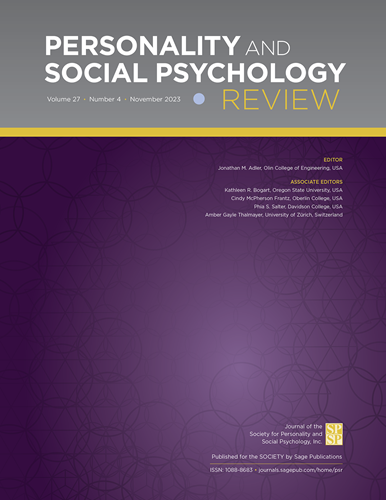一个人的行为“老化不良”:一个理解印象管理错误和时间印象管理挑战的综合自我中心框架
IF 10.4
1区 心理学
Q1 PSYCHOLOGY, SOCIAL
引用次数: 0
摘要
学术摘要:为什么人们很难给人留下积极的印象?事实上,现在在心理学文献中有许多记录在案的印象管理效应,强调了演员在许多方面给观察者留下负面印象,尽管他们本想给观察者留下积极印象。在本文中,我们使用自我中心主义的过程模型(即人们倾向于通过首先锚定然后从自己的角度进行充分调整来采取他人的观点)来整合和理解行为者在一个简单的概念框架下的错误。然后,我们使用这个框架来推进文献,强调以自我为中心的锚定和调整的相同逻辑如何有助于为时间印象管理的挑战带来新的亮点——也就是说,即使现在的观察者认为他们是积极的,但现在的行动者如何可能错误地以未来观察者认为消极的方式行事(即,一个人的行为“老化不良”)。我们回顾和整合对这些观点的各种支持,并突出新的研究方向。这篇文章强调了人们在试图给别人留下积极印象时是如何过度关注自己的现状的,并解释了为什么人们很难给别人留下积极印象。随着时间的推移,这个问题变得越来越严重,导致人们忽视了他们现在的行为如何“老化”到未来。因此,针对人们暂时思维的策略可以帮助人们更好地驾驭当今快速变化的信息环境。事实上,“衰老不良”的概念越来越受到现实世界的关注和关注(例如,在今天的网络环境中,参与者留下了他们当前行为的具体数字足迹,供未来的观察者发现和重新判断)——本文提供了一个理解这些问题的框架(例如,谁更倾向于以“衰老不良”的方式行事?以及何时以及为什么会出现这种情况?),并为研究他们制定了一个研究议程,其中包括演员如何更好地驾驭他们的时间印象。本文章由计算机程序翻译,如有差异,请以英文原文为准。
One’s Actions “Aging Poorly”: An Integrative Egocentric Framework for Understanding Impression Management Errors and the Challenge of Temporal Impression Management
Academic Abstract Why do people struggle to make positive impressions? Indeed, there are now many documented impression mis management effects across the psychological literature, highlighting many ways in which actors make negative impressions on observers despite intending to make positive ones. In this article, we use the process model of egocentrism (i.e., people’s tendencies to take others’ perspectives by first anchoring on—then insufficiently adjusting from—their own perspective) to integrate and understand actors’ errors under a single parsimonious conceptual framework. We then use this framework to advance the literature, highlighting how the same logic of egocentric anchoring and adjustment can help shine novel light on the challenge of temporal impression management—that is, how present actors may mistakenly behave in ways that future observers deem negative, even if present observers deem them positive (i.e., one’s actions “aging poorly”). We review and integrate diverse support for these ideas and highlight novel research directions. Public Abstract This article highlights how people over-attend to their own present states when trying to make positive impressions on others, explaining why people struggle to make them. This problem grows worse over time, leading people to neglect how their present actions might “age poorly” into the future. Strategies that target people’s temporal thinking can therefore help people better navigate today’s rapidly changing informational landscape. Indeed, the notion of “aging poorly” is of increasing real-world relevance and concern (e.g., in today’s online contexts, whereby actors leave concrete digital footprints of their present actions for future observers to discover and judge anew)—this article provides a framework for understanding these issues (e.g., who is more vs. less prone to acting in ways that “age poorly,” and when and why is this the case?) and generates a research agenda for studying them, which includes how actors can better navigate their temporal impressions moving forward.
求助全文
通过发布文献求助,成功后即可免费获取论文全文。
去求助
来源期刊

Personality and Social Psychology Review
PSYCHOLOGY, SOCIAL-
CiteScore
19.00
自引率
1.90%
发文量
20
期刊介绍:
Title: Personality and Social Psychology Review (PSPR)
Journal Overview:
Official journal of SPSP, the Society for Personality and Social Psychology, Inc.
Premiere outlet for original theoretical papers and conceptual review articles in all areas of personality and social psychology
Features stimulating conceptual pieces identifying new research directions and comprehensive review papers providing integrative frameworks for existing theory and research programs
Topics Covered:
Attitudes and Social Cognition: Examines the inner workings of the human mind in understanding, evaluating, and responding to the social environment
Interpersonal and Group Processes: Explores patterns of interaction and interdependence characterizing everyday human functioning
Intergroup Relations: Investigates determinants of prejudice, conflict, cooperation, and harmonious relationships between social groups
Personality and Individual Differences: Focuses on causes, assessment, structures, and processes giving rise to human variation
Biological and Cultural Influences: Studies the biological and cultural mediation of social psychological and personality processes
 求助内容:
求助内容: 应助结果提醒方式:
应助结果提醒方式:


